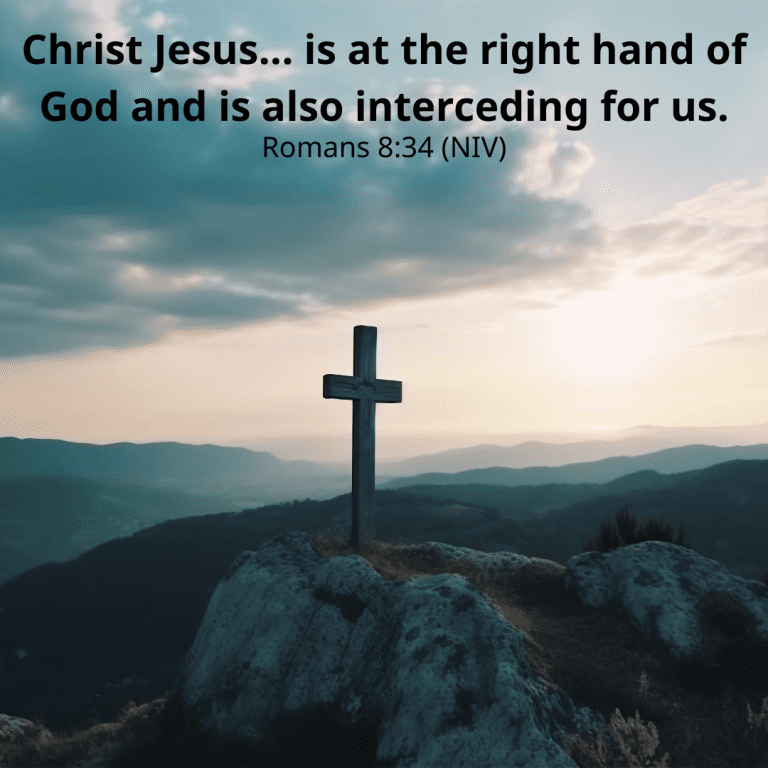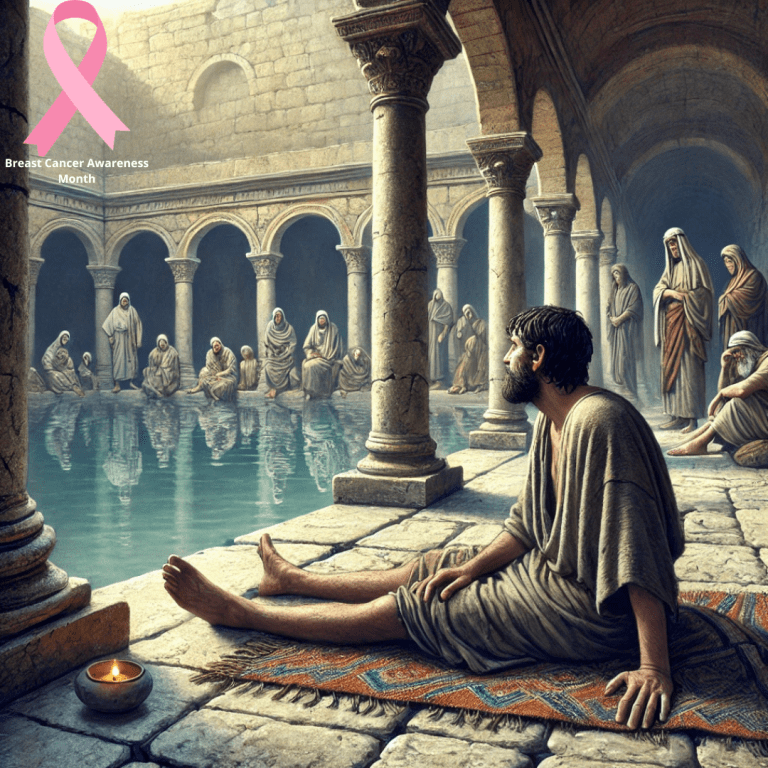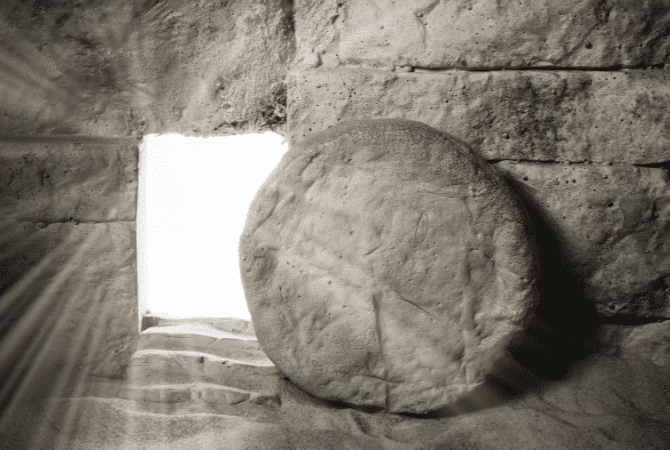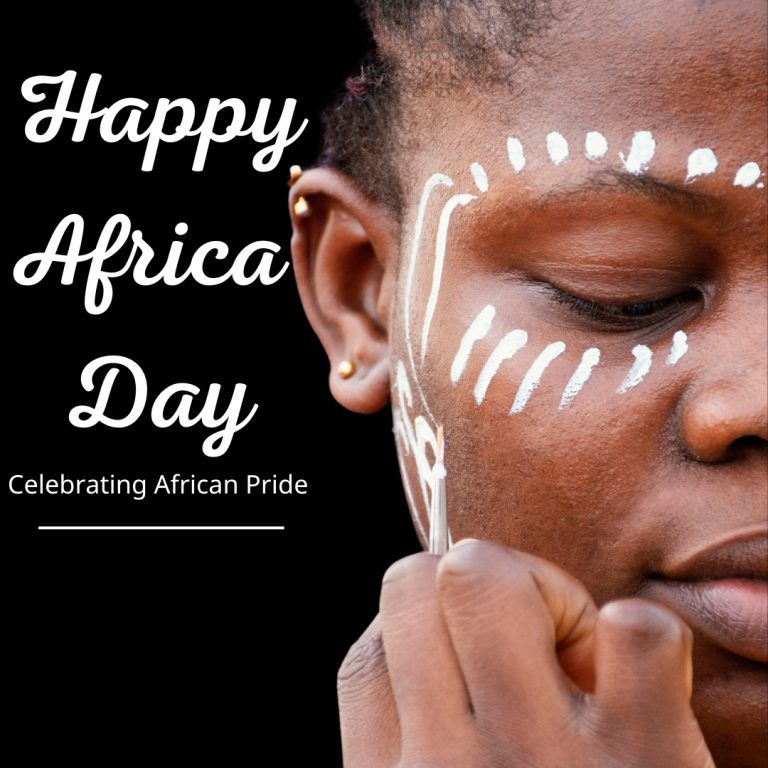
Day 1 – Jesus Finished It
“After he said this, he was taken up before their very eyes, and a cloud hid him from their sight.” — Acts 1:9 (NIV)
When Jesus ascended into heaven, it wasn’t just a dramatic exit , it was a powerful moment of completion. Everything He came to do from healing the sick to dying on the cross and rising again was now finished. The Ascension confirmed that He had completed His mission and was returning to take His place at the right hand of God.
But here’s what’s exciting: Jesus didn’t leave us to figure things out alone. His going up meant something new was coming, the Holy Spirit. So as we begin this Ascension Week, be encouraged: the One who overcame death didn’t just rise , He rules. He finished the work, and now He’s calling you into it.
What’s one thing you can surrender to Jesus today, knowing He’s already won?
Day 2 – He Went Up to Lift Us Up
“God raised him from the dead and seated him at his right hand in the heavenly realms.” — Ephesians 1:20 (NIV)
Jesus’ Ascension wasn’t just about leaving earth, it was about being lifted to a place of honor and authority. He is now seated at the right hand of the Father, ruling over everything. But here’s the wild part — Scripture says we’re raised with Him (Ephesians 2:6)! That means you’re not living a low-level life anymore.
Your identity isn’t based on your followers, your grades, or your mistakes. It’s based on who Jesus is and what He’s done. The Ascension tells us that Jesus is not only alive, He’s in charge. And that gives us boldness to walk in confidence, knowing our Savior is reigning, and our place with Him is secure.
Today, walk with your head held high — not in pride, but in purpose. Jesus went up so you could rise above.
Day 3 – The Mission is Ours Now
“You will receive power when the Holy Spirit comes on you; and you will be my witnesses.” — Acts 1:8 (NIV)
Before Jesus ascended, He left His final instructions — not a goodbye, but a game plan. His mission didn’t end when He left. It passed to us. We’re not just called to believe in Jesus; we’re called to represent Him.
But here’s the best part, we’re not doing it alone. Jesus promised power through the Holy Spirit. That means you’ve got divine help to speak life, love boldly, and live differently. Your school, your family, your online community — they’re all places where your life can point to Jesus.
Ask yourself today: Who in my world needs hope? And how can I be a witness?
Day 4 – Don’t Just Look Up
“Why do you stand here looking into the sky?” — Acts 1:11 (NIV)
Imagine standing there, watching Jesus rise into the sky. You’d probably be frozen too, eyes wide, heart racing. But then, two angels show up and say, “Why are you just standing here?”
Sometimes, we get so caught up in the spiritual moment — the worship, the high of youth camp, the powerful sermon, that we forget to live it out. The disciples had a mission. So do you. The Ascension isn’t just a wow moment; it’s a wake-up moment.
He’s coming back, but until then, we’ve got work to do. Don’t just look up, step out.
This week, choose action. Love someone. Forgive. Encourage. Start living like your faith matters — because it does.
Day 5 – He’s Praying for You
“Christ Jesus… is at the right hand of God and is also interceding for us.” — Romans 8:34 (NIV)
Jesus didn’t ascend to forget about you. He ascended to represent you. Right now, Jesus is sitting next to the Father — and guess what He’s doing? Praying for you.
He knows your struggles. He hears your silent prayers. He sees what you’re not saying out loud. And He’s talking to the Father on your behalf. You’re not alone in your battles — heaven is backing you up.
When life feels heavy, remember this: Jesus is interceding. You’re seen, known, and supported from above.
Day 6 – We’re Waiting for Power
“Stay in the city until you have been clothed with power from on high.” — Luke 24:49 (NIV)
The disciples wanted to go, but Jesus told them to wait. Why? Because what was coming next needed more than good intentions — it needed power.
Sometimes we want to rush ahead with our own plans. But Jesus teaches us that there’s strength in waiting. In that waiting, He prepares us, shapes us, and fills us. And then, when the time is right, He launches us with power we never knew we had.
If you’re in a season of pause right now, don’t panic. God is preparing to pour something out. Get ready.
Day 7 – He’s Coming Back
“This same Jesus… will come back in the same way you have seen him go into heaven.” — Acts 1:11 (NIV)
The Ascension reminds us that Jesus went up, but the story isn’t over. One day, He’s coming back — not as a suffering servant, but as a victorious King. That truth should shift the way we live today.
Knowing He’s coming again means we live with hope, not fear. We treat others with love, not hate. We don’t waste our time, we make it count. He’s coming back, and we want to be found ready.
Let this week stir your heart with hope. Jesus is not done with the world. And He’s not done with you.

As we step into a brand-new year, it’s easy to get caught up in the “New Year, New Me” vibe. Social media is buzzing with resolutions, glow-ups, and vision boards. But let’s pause for a second, what if a fresh start isn’t just about what we do but about what God is doing in us?
1. A Promise of Renewal
The Bible is full of stories where God hits the reset button. Think about Noah. After the flood, God gave humanity a second chance. The rainbow became a symbol of His promise to never give up on us. Genesis 9:13 says, “I have set my rainbow in the clouds, and it will be the sign of the covenant between me and the earth.” This covenant reminds us that no matter how overwhelming life gets, God is always faithful to renew His relationship with us. He’s not just a God of second chances but of endless chances, each wrapped in His love and grace.
2. Grace for the Israelites
The Israelites messed up countless times, yet God’s grace led them into the Promised Land. His faithfulness shows us that no mistake is too big for a fresh start. Deuteronomy 31:8 reminds us, “The Lord himself goes before you and will be with you; he will never leave you nor forsake you. Do not be afraid; do not be discouraged.” Even in seasons of wandering and waiting, God was their guide and protector. This narrative is a powerful reminder that God’s presence remains constant, even when we lose our way.
3. Becoming a New Creation
Through Jesus, we’re not just given a clean slate, we’re made new. 2 Corinthians 5:17 declares, “Therefore, if anyone is in Christ, the new creation has come: The old has gone, the new is here!” This verse is a reminder that God’s transformation starts within. Being a new creation doesn’t mean life gets easier; it means we’re empowered by the Holy Spirit to live differently. It’s about leaving behind the labels and lies that once defined us and stepping boldly into the identity God has given us.
4. Letting Go of the Past
Sometimes life feels messy, and it’s hard to move forward. But God’s Word encourages us to release what’s behind. Isaiah 43:18-19 says, “Forget the former things; do not dwell on the past. See, I am doing a new thing!” God’s plans for us are always forward-focused. Letting go doesn’t mean pretending the pain or mistakes never happened. It means trusting God to use even our brokenness for His glory and to lead us into something better.
5. Daily Renewal Through Mercy
God’s mercies aren’t just for the start of the year, they’re new every single morning. Lamentations 3:22-23 proclaims, “Because of the Lord’s great love we are not consumed, for his compassions never fail. They are new every morning; great is your faithfulness.” This means every day is a fresh start. No matter how badly yesterday went, today is a chance to start over with God’s compassion as our foundation. His love is unshakable, and His faithfulness is unending.
6. Bold Steps of Faith
A fresh start often requires bold moves, like stepping out in faith. Joshua 1:9 encourages us, “Have I not commanded you? Be strong and courageous. Do not be afraid; do not be discouraged, for the Lord your God will be with you wherever you go.” Trust that God’s got your back as you move forward. Taking bold steps can feel scary, but it’s often where we grow the most. It’s in these moments of uncertainty that we discover the depth of God’s strength and provision.
7. Trusting in His Plans
As we embrace a new year, we can find peace in knowing that God’s plans are always for our good. Jeremiah 29:11assures us, “For I know the plans I have for you,” declares the Lord, “plans to prosper you and not to harm you, plans to give you hope and a future.” This promise doesn’t mean life will be problem-free, but it does mean that God’s purposes are perfect. Even when things don’t make sense, we can trust that He is working all things together for our good.
How to Make It Practical
- Pray About It: Ask God to show you what areas of your life need a reset. Be honest with Him; He can handle it.
- Find Your Squad: Surround yourself with people who point you toward Jesus. Life hits different when you’ve got a community that lifts you up.
- Set God-Centered Goals: Instead of just focusing on fitness or finances, think about how you can grow spiritually this year. Maybe it’s reading your Bible daily or serving others.
A Fresh Start for Everyone
Whether you’re stepping into this year with excitement or dragging last year’s baggage behind you, remember this: God specializes in fresh starts. He’s not limited by our failures or fears. His love is bigger, His grace is stronger, and His plans are better than anything we could imagine.
So, as you kick off this year, don’t just strive for change, invite God into your journey. He’s ready to write a new chapter in your story. Are you?

Matthew 14:26-31 But when the disciples saw him walking on the sea, they were terrified, and said, “It is a ghost!” and they cried out in fear. But immediately Jesus spoke to them, saying, “Take heart; it is I. Do not be afraid.” And Peter answered him, “Lord, if it is you, command me to come to you on the water.” He said, “Come.” So Peter got out of the boat and walked on the water and came to Jesus. But when he saw the wind, he was afraid, and beginning to sink he cried out, “Lord, save me.” Jesus immediately reached out his hand and took hold of him, saying to him, “O you of little faith, why did you doubt?”
Faith in God can move us beyond the impossible, but doubt weakens us. This is an important lesson for Peter at this time, and for you and me today. Things that are impossible without faith, like walking on water, can become possible with faith.
Question: In which areas of your life could your faith be stronger?

Judges 13:3-5 And the angel of the LORD appeared to the woman and said to her, “Behold, you are barren and have not borne children, but you shall conceive and bear a son. Therefore be careful and drink no wine or strong drink, and eat nothing unclean, for behold, you shall conceive and bear a son. No razor shall come upon his head, for the child shall be a Nazirite to God from the womb, and he shall begin to save Israel from the hand of the Philistines.”
To read about the Nazarite vow, read Numbers 6.
Question: Like Samson, who was called for a special purpose even before birth, what unique talents or roles do you feel called to, and how can you use them to serve your community or nation?

John 5:14 “Later Jesus found him at the temple and said to him, ‘See, you are well again. Stop sinning or something worse may happen to you.’”
Jesus later finds the man and gives him a warning, urging him to live a life free from sin. While physical healing is important, Jesus points to the need for spiritual healing and holiness, emphasizing that the health of the soul matters just as much as the body.
Reflection Questions:
- What spiritual areas in your life need healing or attention in the same way the man’s body needed healing?
- How do you see the connection between physical and spiritual well-being?

Perhaps you’ve selected a Bible and started reading it. Maybe you’re even setting aside regular times to reflect or pray. You’ve gotten a taste of what’s inside, and a desire for God’s words is growing in you as you recognize the nourishment God offers in these encounters. What comes next? How do you go from a surface reading to unlocking and taking in more and more of what God has for you?
Whether you are reading the Bible for devotion, prayer, or academic learning, it is helpful to know how to study a Scripture passage. Studying helps us understand Scripture in its context, setting the stage for us to hear how God continues to speak to us through it today.
Find a comfy chair, pour a cup of coffee, and join me in studying the parable of the lost coin in Luke 15:8-10. Download this worksheet to try these ten steps on a passage of your choosing—alongside my example or anytime after.
1. Pray
Begin your time with prayer. Take a moment to clear your mind and focus your attention. Ask God to be with you as you study and reflect on this passage:
“Dear God, meet me as I read your Word. Give me eyes to see, ears to hear, and a heart to understand. Amen.”
2. Read the passage
Get familiar with your passage by reading it several times. Try reading it in different translations: at least one that is more word-for-word (like NRSV, NKJV, or NASB) as well as a translation that is more thought-for-thought (like GNT, NLT, or the Message). Notice how different translations help you understand the passage in different ways. What words and images stand out to you?
NRSV: “Or what woman having ten silver coins, if she loses one of them, does not light a lamp, sweep the house, and search carefully until she finds it? When she has found it, she calls together her friends and neighbors, saying, ‘Rejoice with me, for I have found the coin that I had lost.’ Just so, I tell you, there is joy in the presence of the angels of God over one sinner who repents.”
The Message: “Or imagine a woman who has ten coins and loses one. Won’t she light a lamp and scour the house, looking in every nook and cranny until she finds it? And when she finds it you can be sure she’ll call her friends and neighbors: ‘Celebrate with me! I found my lost coin!’ Count on it—that’s the kind of party God’s angels throw every time one lost soul turns to God.”
3. Who is speaking? To whom are they speaking?
Sometimes the speaker and audience are disclosed in the passage; other times you have to go back several verses or chapters. In this passage, the previous verses tell us that the tax collectors and sinners were coming near to listen to Jesus. This made the Pharisees and scribes—the religious professionals—grumble. So Jesus addresses this teaching to them (Luke 15:1-3). Knowing Jesus is speaking these words makes us hear them as spoken with his authority. Take into account who is speaking, who they are speaking to, and what they are speaking about to discern the meaning and relative weight of your passage.
4. Who are the key characters?
Name the characters and find out who they are. Do they appear anywhere else in Scripture? Do they have a backstory? Do they have a title or role? In and around this passage, we have Pharisees and scribes, who are the religious elite in Jesus’s time. We have tax collectors and sinners, who are the outcasts. And we have the unnamed woman of the parable, respectable but with little status in Jewish culture because of her gender.
5. What is the genre of literature?
This teaching is identified as a parable (Luke 15:3), and it follows familiar markers of this type of writing. Parables tell stories using common images—like sheep and agriculture and families—to communicate deeper truths. They are fictional teaching illustrations, usually with some unexpected twist. Jesus often uses parables in teaching his disciples and other followers.
Other biblical genres you will encounter include narrative, law, prophecy, letters, wisdom, and apocalyptic literature. Identifying the genre helps us know how to read the passage—is this meant to be literal or figurative? Is it teaching or telling me something? Knowledge of the genre can help point us toward the intended meanings, similar to how we would read a novel or a history book with different expectations.
6. What does the original language say?
This step may sound daunting, but online tools now make the Greek and Hebrew behind our English translations more accessible to any reader. My favorite is Blue Letter Bible. Type in your Bible reference, then click on a specific verse to see it expanded in the original language. From that view, you can select a word and connect to its entry in their edition of Strong’s Concordance. You can see where else in the Bible this word has been used and the ways other translators have translated it, giving you a more nuanced understanding of its meaning.
7. What comes before and after the passage?
As we saw, zooming out a little helps us read the passage in context. What is happening before and after your verses? Is your passage a continuation of what came before? Is it setting up something that comes later?
Often parables come in a series, each expounding on the same teaching, or interpreting the other. In this passage, the parables before and after further illustrate the same concept. Each tells about something (or someone) that was lost being found—a lost sheep, a lost coin, a lost son. Each gives a metaphor for God personally seeking out the lost—the shepherd, the woman, the father. The recovery leads to great rejoicing, pointing to God’s joy “over one sinner who repents” (Luke 15:10).
8. What are characteristics of the whole book?
Zoom out even further. What can you find out about the whole book? You may want to consult a commentary, online Bible resource, or notes included with your Bible or study Bible. What is the historical or cultural context? What are the book’s themes? Do you know who wrote or compiled it? Remember, much of the New Testament was written in the Ancient Near East during the first century, and the Old Testament is even older, so its assumptions are very different from ours in the global twenty-first century!
Often some of this information can be found in the first chapter. The author may identify who they are speaking as, address their audience, or state their purpose. For our passage, we can identify Luke as one of the four Gospels, or accounts of the life of Jesus. Luke set out to write an “orderly account” about Jesus’s life, ministry, death, and resurrection (Luke 1:1-4).
Luke’s Gospel is set within the Roman Empire, which had harsh class distinctions and power structures. There were clear “in groups” and “out groups.” The poor, women, and certain ethnic groups were at the bottom of society, often shunned and mistreated. But throughout Luke, Jesus’s call includes the outsiders. And Jesus calls his disciples to do the same.
9. What is the passage’s message to its intended audience?
There are always layers to the audience when reading Scripture. Consider who is listening to the message, who the book was written to, who this writing spoke to on a wider scale, and who is receiving its words today. In this passage we have the hearers of Jesus, the church community of Luke, the wider New Testament church, and us too.
Piecing all our research together, we now get to make some initial conclusions. The Pharisees and scribes, who are powerful and elite, are grumbling because Jesus is including sinners and outcasts in his ministry. This is an ongoing tension throughout Luke’s Gospel. In response, Jesus uses a series of parables to reiterate that including outsiders is the focus of his ministry—and one of God’s primary concerns. Jesus came to seek out the lost, and God rejoices greatly when they are found. He uses an image of a woman—someone who did not have status in his culture—to represent God diligently seeking out those who are lost and celebrating at their return.
10. Reflect on the passage’s significance for you
The last step is to take all your gleanings and contemplate what this passage may be saying to you. Each person will find that different aspects or truths stand out. God may be showing you something specific about your own journey and spiritual growth. Take time to reflect and listen.
What is God saying to you as you reflect on the parable of the lost coin? Consider these questions: Who are the lost or outcasts in your culture, community, family? If God seeks out the lost, are you called to do the same? How might you do this? Conversely, what are lost parts of yourself, in need of Jesus? In what ways might God be seeking you now? How would it feel to be found?
As you go forward, live with the passage. Let the words and observations take root inside you. See if they come to mind in certain situations, giving you wisdom or insight or calling you to take an action. Let the passage’s meanings mature in you over time.
American Bible Society Web Resources – Bible Engager’s Blog
© American Bible Society

Easter, the cornerstone of the Christian faith, holds a profound significance for believers worldwide. Beyond its traditional observance, Easter offers a timeless message of hope, renewal, and redemption—a message that resonates deeply with every generation. In an era marked by uncertainty and rapid change, the timeless truths of Easter provide a steadfast anchor for young hearts seeking meaning and purpose.
In today’s fast-paced world, where digital distractions abound and societal norms constantly evolve, people often grapple with questions of identity, belonging, and purpose. Easter, with its celebration of Christ being raised from the dead, offers a totally cool story of how things change and get fresh again, a reminder of what really took place in Jerusalem that speaks directly to the challenges and aspirations of the current generation.
The Promise of a fresh start:
At the heart of Easter lies the promise of a fresh start, a promise fulfilled through the sacrificial love of Jesus Christ. As the Apostle Paul writes in Romans 5:8 (ESV), “but God shows his love for us in that while we were still sinners, Christ died for us.” The crucifixion of Jesus, foretold in the scriptures, serves as the ultimate expression of God’s boundless mercy and grace, offering you the gift of reconciliation and forgiveness. Easter’s message offers the promise of a fresh start and a renewed sense of purpose.
Hope Amidst Uncertainty:
In a world plagued by uncertainty and unrest, Easter offers a signal of hope. The resurrection of Jesus Christ reminds you that even in the darkest of times, there is light and life beyond the shadows. As you navigate the difficulties of modern life, the promise of Easter serves as a source of comfort and assurance, guiding you through moments of doubt and despair.
1 Peter 1:3 (ESV) : “Praise be to the God and Father of our Lord Jesus Christ! In his great mercy he has given us new birth into a living hope through the resurrection of Jesus Christ from the dead,”
The Promise of Eternal Life:
Easter holds forth the promise of eternal life, a hope that surpasses the boundaries of time and space. Jesus declares in John 11:25-26 (ESV), “Jesus said to her, “I am the resurrection and the life. Whoever believes in me, though he die, yet shall he live, and everyone who lives and believes in me shall never die. Do you believe this?. Through His resurrection, Jesus offers the assurance of life beyond the grave, inviting you into a relationship marked by joy, peace, and everlasting fellowship with God.
The Call to Renewal:
Easter extends a timeless invitation to renewal, a call to embrace the life-changing power of Christ’s resurrection in your own life. As Paul writes in 2 Corinthians 5:17 (ESV), “Therefore, if anyone is in Christ, he is a new creation. The old has passed away; behold, the new has come.” Just as Christ emerged from the tomb in glorious resurrection, you too are invited to cast off the shackles of sin and embrace the abundant life that comes through faith in Him.
Conclusion:
As you journey through the Easter season, may you pause to reflect on the profound truths found within the Word of God. May you embrace the promise of redemption, rejoice in the triumph of resurrection, and respond to the call to renewal with a heart full of faith and gratitude. And may the timeless message of Easter continue to inspire and uplift you, bringing you even closer to the love and grace of our Risen Savior.

Come feel Africa’s rhythm! Its heart tells stories of winning, strength, and togetherness. As the sun shines on its big lands and lively cultures, we’re on the edge of Africa Day. It’s a party that goes beyond borders, celebrating what it means to be African.
A – Abundance of Blessings
Africa is blessed with natural wonders and resources, reflecting God’s abundant provision. Psalm 68:19 reminds us, “Praise be to the Lord, to God our Savior, who daily bears our burdens.”
F – Faithful Foundations
Africa’s history is intertwined with faith, from the ancient civilizations to modern-day believers. Hebrews 11:1 inspires us, “Now faith is confidence in what we hope for and assurance about what we do not see.”
R – Richness of Diversity
Africa’s diverse peoples and cultures showcase the beauty of God’s creation. Galatians 3:28 proclaims, “There is neither Jew nor Gentile, neither slave nor free, nor is there male and female, for you are all one in Christ Jesus.”
I – Inheritance of Identity
Africa’s heritage is a testament to the enduring legacy of its people. Psalm 16:6 assures us, “The boundary lines have fallen for me in pleasant places; surely I have a delightful inheritance.”
C – Call to Community
Africa’s communal spirit fosters unity and solidarity among its inhabitants. Ecclesiastes 4:9-10 teaches us, “Two are better than one, because they have a good return for their labor: If either of them falls down, one can help the other up. But pity anyone who falls and has no one to help them up.”
A – Affirmation
The Bible affirms the inherent value and dignity of every individual, echoing the principle of ubuntu prevalent in many African cultures.”So God created mankind in his own image, in the image of God he created them; male and female he created them.” – Genesis 1:27
As we journey through the spiritual essence of AFRICA, let us embrace its blessings, celebrate its diversity, and honor its heritage. For in this vast and vibrant continent, we discover echoes of God’s faithfulness, reminders of our shared humanity, and glimpses of His divine purpose for all creation. Let us unite in prayer, as Psalm 133:1 proclaims, “How good and pleasant it is when God’s people live together in unity!”

2. Peter’s faith and doubt
"Take heart; it is I. Do not be afraid." And Peter answered him, "Lord, if it is you, command me to come to you on the water." He said, "Come." So Peter got out of the boat and walked on the water and came to Jesus.

Samson's Birth and Vow as a Nazirite
Therefore be careful and drink no wine or strong drink, and eat nothing unclean, for behold, you shall conceive and bear a son. No razor shall come upon his head, for the child shall be a Nazirite to God from the womb, and he shall begin to save Israel from the hand of the Philistines."

Day 6: A Call to Holiness
Jesus later finds the man and gives him a warning, urging him to live a life free from sin. While physical healing is important, Jesus points to the need for spiritual healing and holiness, emphasizing that the health of the soul matters just as much as the body.

HOW TO STUDY THE BIBLE
Perhaps you’ve selected a Bible and started reading it. Maybe you’re even setting aside regular times to reflect or pray. You’ve gotten a taste of what’s inside, and a desire for God’s words is growing in you as you recognize the nourishment God offers in these encounters. What comes next? How do you go from a surface reading to unlocking and taking in more and more of what God has for you? Whether you are reading the Bible for devotion, prayer, or academic learning, it is helpful to know how to study a Scripture passage. Studying helps us understand Scripture in its context, setting the stage for us to hear how God continues to speak to us through it today. Find a comfy chair, pour a cup of coffee, and join me in studying the parable of the lost coin in Luke 15:8-10. Download this worksheet to try these ten steps on a passage of your choosing—alongside my example or anytime after. 1. Pray Begin your time with prayer. Take a moment to clear your mind and focus your attention. Ask God to be with you as you study and reflect on this passage: “Dear God, meet me as I read your Word. Give me eyes to see, ears to hear, and a heart to understand. Amen.” 2. Read the passage Get familiar with your passage by reading it several times. Try reading it in different translations: at least one that is more word-for-word (like NRSV, NKJV, or NASB) as...

Easter: The awesome story of how we're saved and brought back to life
Easter, the cornerstone of the Christian faith, holds a profound significance for believers worldwide. Beyond its traditional observance, Easter offers a timeless message of hope, renewal, and redemption—a message that resonates deeply with every generation. In an era marked by uncertainty and rapid change, the timeless truths of Easter provide a steadfast anchor for young hearts seeking meaning and purpose. In today’s fast-paced world, where digital distractions abound and societal norms constantly evolve, people often grapple with questions of identity, belonging, and purpose. Easter, with its celebration of Christ being raised from the dead, offers a totally cool story of how things change and get fresh again, a reminder of what really took place in Jerusalem that speaks directly to the challenges and aspirations of the current generation. The Promise of a fresh start: At the heart of Easter lies the promise of a fresh start, a promise fulfilled through the sacrificial love of Jesus Christ. As the Apostle Paul writes in Romans 5:8 (ESV), “but God shows his love for us in that while we were still sinners, Christ died for us.” The crucifixion of Jesus, foretold in the scriptures, serves as the ultimate expression of God’s boundless mercy and grace, offering you the gift of reconciliation and forgiveness. Easter’s message offers the promise of a fresh start and a renewed sense of purpose. Hope Amidst Uncertainty: In a world plagued by uncertainty and unrest, Easter offers a signal of hope. The resurrection of Jesus Christ reminds you that...

"Take heart; it is I. Do not be afraid." And Peter answered him, "Lord, if it is you, command me to come to you on the water." He said, "Come." So Peter got out of the boat and walked on the water and came to Jesus.

Therefore be careful and drink no wine or strong drink, and eat nothing unclean, for behold, you shall conceive and bear a son. No razor shall come upon his head, for the child shall be a Nazirite to God from the womb, and he shall begin to save Israel from the hand of the Philistines."

Jesus later finds the man and gives him a warning, urging him to live a life free from sin. While physical healing is important, Jesus points to the need for spiritual healing and holiness, emphasizing that the health of the soul matters just as much as the body.



What is Ascension week
Jesus' Ascension wasn’t just about leaving earth, it was about being lifted to a place of honor and authority. He is now seated at the right hand of the Father, ruling over everything. But here’s the wild part — Scripture says we’re raised with Him (Ephesians 2:6)! That means you’re not living a low-level life anymore.

Jesus' Ascension wasn’t just about leaving earth, it was about being lifted to a place of honor and authority. He is now seated at the right hand of the Father, ruling over everything. But here’s the wild part — Scripture says we’re raised with Him (Ephesians 2:6)! That means you’re not living a low-level life anymore.

Unlocking the Spiritual Essence of AFRICA:
As we journey through the spiritual essence of AFRICA, let us embrace its blessings, celebrate its diversity, and honor its heritage. For in this vast and vibrant continent, we discover echoes of God's faithfulness, reminders of our shared humanity, and glimpses of His divine purpose for all creation.

As we journey through the spiritual essence of AFRICA, let us embrace its blessings, celebrate its diversity, and honor its heritage. For in this vast and vibrant continent, we discover echoes of God's faithfulness, reminders of our shared humanity, and glimpses of His divine purpose for all creation.
